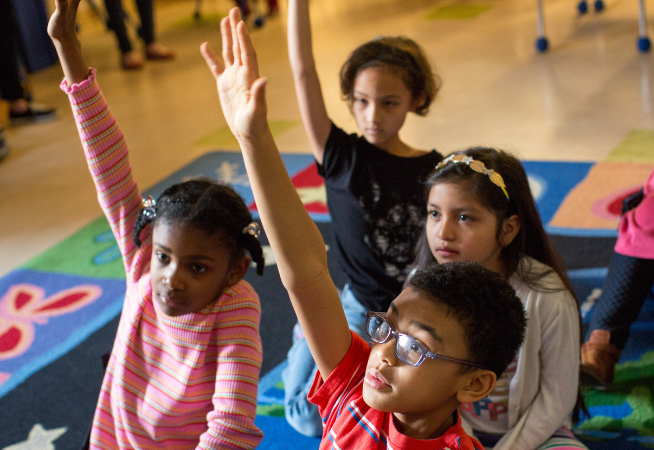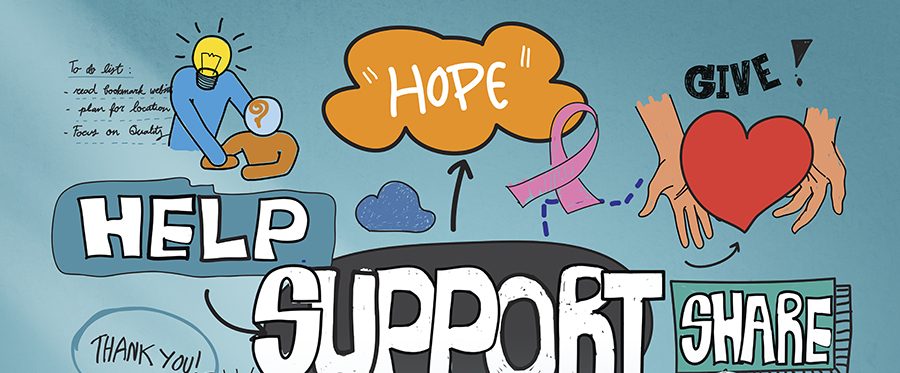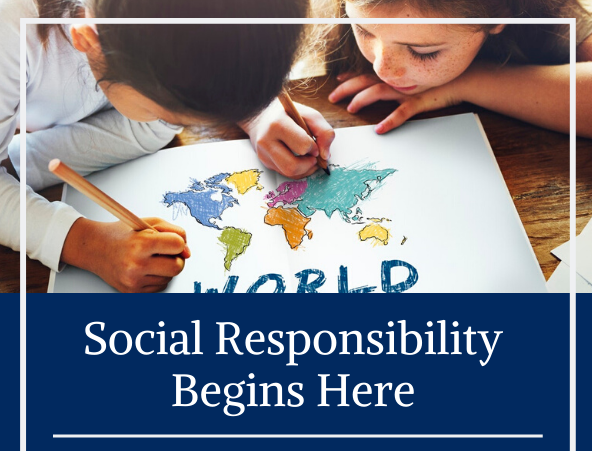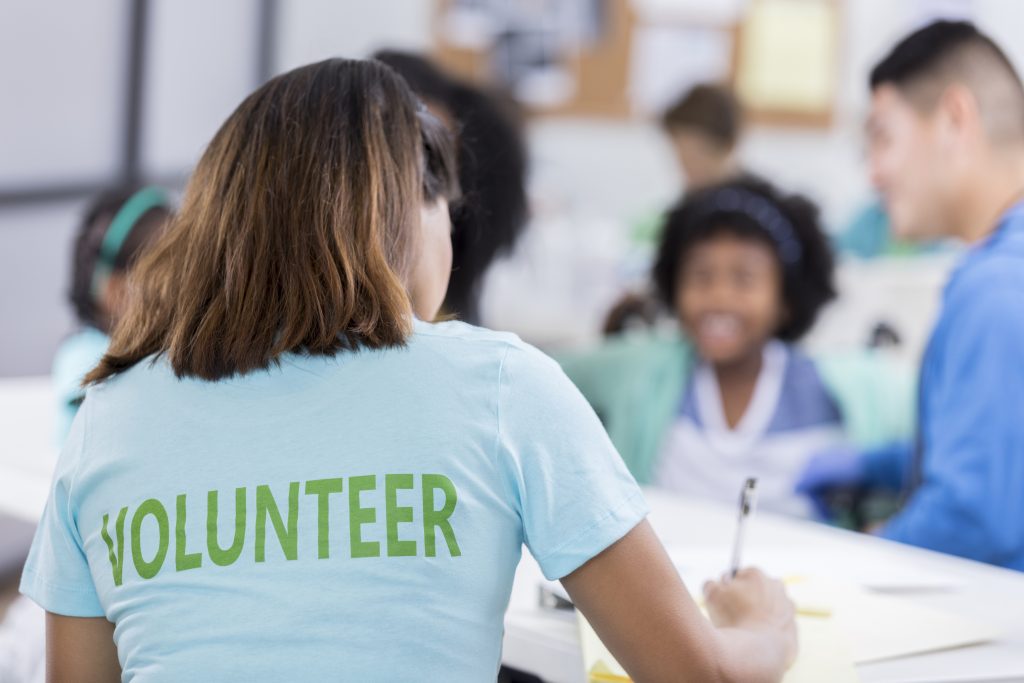

A little bit of humility can always change the world
When we see advertisements on social initiatives by big brands, what do we perceive? These are renowned companies that contribute and understand their responsibility towards society. Giving back to the people or community is indeed what fetches them glory and empathy. With millions of companies around the world expanding their social activities, CSR is inescapable.
Students today know that to be a part of any big corporate house, they need to be an all-rounder. After all, the most notable criterion for being selected by an MNC is to be a part of multiple activities. Most renowned companies today have made it mandatory to have some form of volunteer experience. Corporate social activities can change a student’s mindset by developing a global outlook in them. Irrespective of the origin of the place, they contribute to CSR activities anywhere, be it in a remote rural area or a smart city. It is interesting to see how the world has shrunk when it comes to communication. Someone could be helping a child or an NGO from a developed country, teaching or contributing towards health facilities or imparting training through practical-oriented courses to build their small scale industries in a rural, remote place in India.


CSR has been talked about for many years now, but the impact of Individual Social Responsibility (ISR) on the communities and the global corporate environment is also becoming increasingly important. ISR is about individuals becoming responsible in their actions affecting communities in their immediate circle and also beyond. It includes the engagement of each individual in the community where he/she currently lives, actively participates in its development, and work together to solve community problems. One of the main objectives of ISR is to make the community a better place.
When students are well aware that Corporate Social Responsibility will always be a part of their life, they become more passionate about it. Many universities and colleges, especially Management Colleges, have made it mandatory to include Corporate Social Responsibility (CSR) or Student Social Responsibility (SSR) as a subject. Due to this, students are now moving towards becoming better human beings. By participating in social activities, they are also opening doors for increased global opportunities and benefits. They are aware that if they want to grow in life, being a responsible citizen is a must. By being a part of corporate social activities, the chances of economic development increase as well. This helps them as well as the place they belong to a great extent.
In raising ethics training within university students, SSR plays a huge role in educating the younger generation about the importance of caring for the environment. It is undeniable that CSR practice and understanding are still nascent among the younger generation in our country.
Corporate Social Responsibility programmes are a given at most companies these days, but that does not necessarily mean all companies have truthfully accepted the calling to be good corporate citizens. Some CSR programmes are nothing more than a marketing game, and a poorly executed one at that. They even struggle to get employees excited to participate and give back to the community.
Individual Social Responsibility (ISR) Vs Student Social Responsibility (SSR)
CSR has been talked about for many years now, but the impact of Individual Social Responsibility (ISR) on the communities and the global corporate environment is also becoming increasingly important. ISR is about individuals becoming responsible in their actions affecting communities in their immediate circle and also beyond. ISR includes the engagement of each individual in the community where he/she currently lives, actively participates in its development, and work together to solve community problems. One of the main objectives of ISR is to make the community a better place. It is driven by intrinsic altruism regardless of material incentives, social or self-esteem concerns for the individual. In addition, one finds these motives are mutually interdependent, and both policymakers and social activists must have a good understanding of these interactions to effectively influence individuals’ desires to engage in socially responsible behaviours.
I firmly believe that if a child understands life skills, is inculcated values of giving to the society at an early age, the child will be more aware of its surroundings and will be a better human being in the long run. A child learns ethics through practical experience.
 The relationship between Individual Social Responsibility and the impact on Corporate Social Responsibility is a compelling topic to observe and study. Members of clubs or organisations active in charitable-giving activities are more likely to engage in positive ISR and CSR activities. This is because they learn the importance of socially responsible behaviour through classes and various seminars. Moreover, there is a sense of peer pressure to conform to acceptable social behaviours. I firmly believe that if a child understands life skills, is inculcated values of giving to the society at an early age, the child will be more aware of its surroundings and will be a better human being in the long run. A child learns ethics through practical experience. It is also observed that a student’s Undergraduate Major impacts corporate social responsibility more than just business ethics alone. Management/Business students are no less ethical than non-management/business students. There is a greater need to tailor a business ethics curriculum based on student characteristics. In general, business schools are trying to find new ways to include ISR/SSR and CSR courses in the curriculum.
The relationship between Individual Social Responsibility and the impact on Corporate Social Responsibility is a compelling topic to observe and study. Members of clubs or organisations active in charitable-giving activities are more likely to engage in positive ISR and CSR activities. This is because they learn the importance of socially responsible behaviour through classes and various seminars. Moreover, there is a sense of peer pressure to conform to acceptable social behaviours. I firmly believe that if a child understands life skills, is inculcated values of giving to the society at an early age, the child will be more aware of its surroundings and will be a better human being in the long run. A child learns ethics through practical experience. It is also observed that a student’s Undergraduate Major impacts corporate social responsibility more than just business ethics alone. Management/Business students are no less ethical than non-management/business students. There is a greater need to tailor a business ethics curriculum based on student characteristics. In general, business schools are trying to find new ways to include ISR/SSR and CSR courses in the curriculum.
The most influential persons driving the CSR agenda are specific faculty members. Can Individual Social Responsibility be taught? It ideally depends on the students’ beliefs about their levels of Individual and Corporate Social Responsibility. In addition, it depends on their coursework and extracurricular activities that might have covered topics concerning social responsibility and ethics. It also depends on their demographic and psychographic characteristics.
 The social responsibility of individuals and companies has been gaining attention over the last few years at both national and international levels. When individuals decide to buy one product over another, they often look at what the companies do to benefit society. Moreover, the level of Corporate and Individual Social Responsibility is shown to have a positive impact on the overall reputation of companies. Given this trend, more universities are beginning to incorporate course work into their curriculum that either emphasises social responsibility and ethics or requires students to get out into the community for service as an essential component of the curriculum.
The social responsibility of individuals and companies has been gaining attention over the last few years at both national and international levels. When individuals decide to buy one product over another, they often look at what the companies do to benefit society. Moreover, the level of Corporate and Individual Social Responsibility is shown to have a positive impact on the overall reputation of companies. Given this trend, more universities are beginning to incorporate course work into their curriculum that either emphasises social responsibility and ethics or requires students to get out into the community for service as an essential component of the curriculum.
Many business schools have implemented community requirements into the curriculum so that students are required at some point during their studies to engage with the community as part of a course for which they receive credit. This can be fulfilled in a variety of ways and implemented across campuses and departments. The effects of incorporating this type of programme and requirement into the curriculum indicate that implementing this type of curricular programme is beneficial to the students.
Students’ levels of social responsibility remain with them and impact their perceptions of how responsible companies should be for both societal and consumer welfare. Both dimensions have a positive effect on the perceptions of how companies should benefit consumers and society. Therefore, including this type of programme into the curriculum is beneficial to all students as they get involved with the community and learn to become good citizens while also benefiting from it as the coursework remains with them as they graduate and become a part of other communities. There is a positive impact on students’ ISR and CSR levels, and these perceptions and beliefs are usually enduring. Maybe we can teach social responsibility after all.
 Students who learn about CSR can become more aware of the products they use and the companies that make them. Schools/colleges can make this topic more exciting by thinking up creative ideas that change students’ attitudes toward business ethics and sustainability. As a result, children will be more socially responsible adults who make better purchasing decisions.
Students who learn about CSR can become more aware of the products they use and the companies that make them. Schools/colleges can make this topic more exciting by thinking up creative ideas that change students’ attitudes toward business ethics and sustainability. As a result, children will be more socially responsible adults who make better purchasing decisions.
How to Create Your Own Corporate Social Responsibility Projects
Corporate Social Responsibility ensures that businesses adopt ethical standards when manufacturing and selling their products and services. These standards include sustainability, philanthropy and good labour practices. Many big brands have incorporated social responsibility into their company culture and values.
Learning about Corporate Social Responsibility should start in the classroom, and even younger students can benefit from better business education. Primary school children, for example, can learn about some of their favourite brands that support children around the world through their ‘Building the Change’ initiative.
Encourage students to research CSR topics that interest them. Find ways to encourage students to take action on issues that concern them. This will, in turn, foster active citizenship and build students’ leadership skills. It will also provide an antidote to feelings of powerlessness or apathy.
Ways to Teach Students about Corporate Social Responsibility
 Primary School Students: Teach them concepts like labour conditions and giving back to the local community. Simplify complicated terms and concepts, including how HR policies are formulated. Organise drawing competitions based on Student Social Responsibility.
Primary School Students: Teach them concepts like labour conditions and giving back to the local community. Simplify complicated terms and concepts, including how HR policies are formulated. Organise drawing competitions based on Student Social Responsibility.
Secondary School Students: Guide them to websites that evaluate the environmental and social impacts of consumer products from some of the world’s biggest brands. Let them find out a minimum of five companies that excel when it comes to Corporate Social Responsibility.
High School or Undergrad Students: Let them choose a brand and ask them to evaluate their sustainability values. Let other students ask the presenter student a couple of questions at the end of each presentation to make it more interactive. By participating in such projects, students learn and understand the importance of their responsibilities towards society.


Make Corporate Social Responsibility More Interesting: One way to engage students in CSR is by encouraging them to take up an internship with a local/nearby company. Interning will allow students to gauge how the company manufactures their products and gives back to the local community. They will discover how the company builds a socially responsible business that values transparency and good labour conditions.
Encourage students to research CSR topics that interest them. Find ways to encourage students to take action on issues that concern them. This will, in turn, foster active citizenship and build students’ leadership skills. It will also provide an antidote to feelings of powerlessness or apathy.
 Corporate Social Responsibility is gaining more traction in the business and consumer world. Teaching students about it will help them learn about business ethics and sustainability.
Corporate Social Responsibility is gaining more traction in the business and consumer world. Teaching students about it will help them learn about business ethics and sustainability.
Follow the tips above to create engaging classroom lessons that students will learn from and enjoy.
Geeta Catelino is an Educationist, Consulting Psychologist and CSR Advisor for Corporates and NGOs.

